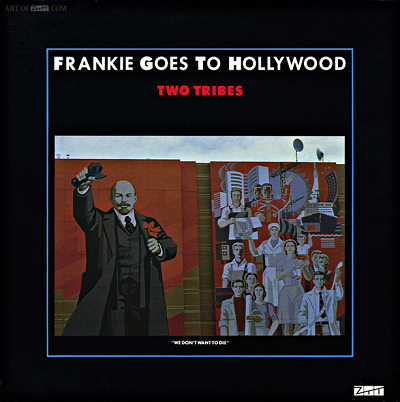1. Frankie Goes To HollywoodTwo Tribes

I’d just turned eight when the BBC banned ‘Relax’ by Frankie Goes To Hollywood; I’m fairly certain I didn’t know a thing about ejaculation, gay sex or S&M, but thanks to Mike Read I soon did.
If I think about it deeply, ‘Relax’ was probably the why I’m generally against censorship in art today: banning things never works, and in fact has the opposite effect – it sensationalises and mythologises both the content and the creator. Any attempts to smooth the edges off art invariably leaves very little room for humour, nuance and interpretation. It’s good to be offended a little bit. It makes the blood feel a fizzy.
I also think the inherent queerness of 80s pop really made my generation more tolerant than previous ones, and Holly Johnson should be more widely credited with the part he played in all that. Surely that is culture’s role: to steer the world to a better, more enlightened place. And what a strange band Frankie were: working class, sleazy, provocative unapologetic and most of all, fun.
So while ‘Relax’ was a great pop song, ‘Two Tribes’ was even better: a thunderous throbber perfectly contrived to evoke fear and excitement at the prospect of imminent Cold War nuclear destruction, which I whole-heartedly believed was just around the corner. The Falklands War had just maimed a lot of young men, while closer to home in the north-east, the Miners’ Strike was happening, the shipyards of Sunderland were closing and ‘Two Tribes’ was the soundtrack to what felt like the great unravelling.
I bought the single from WH Smith and I even remember that ‘Against All Odds’ by Phil Collins was next to it on the shelf in the Top 5. I knew nothing about him but even then, I remember thinking: no, sorry. Not you. It was just an instinctive reaction, I suppose. Without it being explained to me I understood that pop music was all about taking sides, and felt that it was a matter of personal principal that I was on the side of the band who alluded to golden showers and fisting in their videos.


